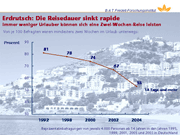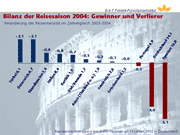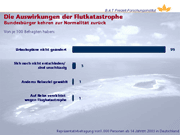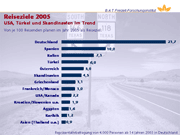21st German Tourism Analysis
Review of the 2004 travel season.
Desire to travel unabated - but journey duration is falling rapidly
The travel industry is experiencing its fourth consecutive year of crisis: terrorist attacks, the Iraq war, SARS and the flood disaster have left their mark on a growth industry that was used to success, but have not been able to change Germans' desire to travel in the long term. Despite global crises, rising energy prices and higher social security contributions, Germans' desire to travel remains unbroken. Germans are still travelling (2002: 53% - 2003: 52% - 2004: 53%) - but holidays are becoming shorter and shorter (1980: 18.2 days - 1990: 16.3 days - 2000: 14.8 days - 2004: 12.8 days). A dramatic double-digit decline in the length of holidays. This is the result of the 21st Tourism Analysis by the Leisure Research Institute of British American Tobacco, in which 4,000 German citizens aged 14 and over were asked about their holiday behaviour in 2004 and their travel intentions in 2005.
„Only at first glance does the holiday remain the most popular form of happiness. In reality, there have been almost landslide-like changes,“ says Prof Dr Horst W. Opaschowski, Director of the Institute. „Last year, the length of holidays reached a new historic low. Fewer and fewer holidaymakers can still afford a two-week trip.“ In 1992, 81 per cent of all travellers travelled for longer than two weeks, in 2000 it was only 74 per cent and last year only 53 per cent. The trend towards ever shorter trips is increasing dramatically and is causing more and more problems for the holiday hotel industry. The Germans' boundless desire to travel has reached its financial limits. The turnaround in prosperity is also reflected in tourism.
Tourism has certainly bottomed out. But holiday budgets are getting tighter and tighter. „So Germans are continuing to practise a new art of living: they are saving the holiday philosophy of the best days of the year by simply shortening the duration of their trip,“ says Professor Opaschowski. „The best thing about a holiday is the anticipation of the next one - even if it's just a short break.“ However, opportunities in the holiday market remain unevenly distributed: Country dwellers, secondary school leavers and lower earners have to stay at home more often.
Between grief and hope:
The effects of the flood disaster.
German citizens return to normality
The flood disaster in South East Asia caused shock and sympathy worldwide. The balancing act between grief and hope, staying at home and travelling is certainly not easy to walk. Whether or not to travel to Southeast Asia again - everyone has to decide for themselves.
What impact will the flood disaster in South East Asia have on tourism in the coming 2005 travel season? In a recent representative survey, 1,000 people were asked about their travel behaviour from 31 January to 5 February 2005. The results of the survey confirm previous crisis reactions. The experience of threat and personal concern diminish over time: Only 1 per cent of German citizens intend to choose a different travel destination this year than originally planned. Similarly, only 1 per cent of those surveyed said that they would not be travelling at all due to the flood disaster in 2005. And 3 per cent are still undecided, but 95 per cent of Germans are returning to normality and are not changing their holiday plans. Only young people, with a lower figure of 90 per cent, indicate a somewhat greater awareness of the crisis.
Opaschowski: „Problems are suppressed and people get used to them. The time factor has an effect.“ A basic law of the World Tourism Organisation (WTO) is proving true: tourism recovers after every crisis.
Package tourism on a downward trend.
Market share shifts due to low-cost airlines
Many holidaymakers are going back to the way things were in the 1950s and organising their own trips again - from transport to accommodation. More and more Germans are realising that you have to be able to afford service. The market share of individually organised trips is now 55 percent:
The group of self-organisers who organise their trip without any help from a travel agency increased from 35% (2000) to 46% (2004).
In the same period, the proportion of modular travellers who only put together individual travel elements such as routes, accommodation or transport themselves and then use a travel agency doubled from 4 to 9 per cent.
Professor Opaschowski: „A new development is emerging: package tourism is on a downward trend. Individual holidays are coming back.“ Not even one in three Germans (29%) booked an organised package tour with transport and accommodation with a tour operator on their last holiday trip (2000: 34% - 2004: 29%).“
The current return to individual travel is primarily due to economic reasons. The modern traveller is a flexible tourist who can travel around the clock, is no longer tied to a tour operator and only uses travel agency services when they are worthwhile or profitable.
The shift from thinking in terms of time to thinking in terms of money could change the holiday landscape over the next few years. Low-cost airlines will soon no longer have to fear the price-performance comparison with the established full-service airlines. This will result in significant shifts in market share between package holidays and individual holidays.
Domestic destinations 2004.
Domestic holidays lose market share to trips abroad
Germany remains the Germans„ favourite holiday destination. However, domestic holidays lost considerable appeal in the 2004 travel season (2003: 38.4% - 2004: 34.3%), which was certainly also due to the weather situation compared to the “summer of the century„ in 2003. Many regular holidaymakers stayed at home. As a result, the domestic holiday regions had to come to terms with stagnation and declines in 2004. The Baltic Sea (8.2%) and Bavaria (7.2%) defended their top position. The third most popular domestic holiday destination is the North Sea (5.9%). Opaschowski: “Domestic tourism is once again losing ground to foreign destinations. These offer more than sea and mountains and can guarantee foreignness and distance, everyday contrasts and southern sunshine."
Destinations abroad 2004.
Turning away from Spain - Austria and Turkey on the winning side
Spain, „the“ international holiday destination for Germans and the most important destination for tour operators, is constantly suffering losses. Since the end of the 1990s, Spain has had to cope with a noticeable drop in the number of visitors - from 17 per cent (1999) to 14 per cent (2002) to 11 per cent last year.
Italy (8.4%), Austria (6.7%) and Turkey (6.1%) benefit from price competition. Compared to the previous year, Austria (+ 2.1 percentage points) and Turkey (+ 2.1) were the winners last season. Scandinavia (+ 0.9), Italy (+ 0.8) and the Caribbean (+ 0.7) can also look forward to growth, as the two most important destinations for Germans (Germany: - 4.0 percentage points; Spain: - 5.1) suffered noticeable losses.
Long-distance travel remains an attractive holiday dream for most Germans, but is more of an exception in economically and politically difficult times. Professor Opaschowski: „The long-distance travel market remains an attractive addition (and not an alternative) to domestic or Mediterranean holiday destinations, primarily for financial reasons.“ The big breakthrough is still a long time coming.
More and more money is being saved on holidays.
A day's holiday may not cost more than 76 euros
Germans spend an average of 1,025 euros per person on their holidays. This does not only include travel and accommodation costs. It also covers all additional expenses such as eating out, shopping, excursions and tips.
Price is becoming increasingly important when choosing a holiday destination. Being economical with your holiday budget means being economical with money and time. A holiday in the Caribbean is almost three times more expensive (2,111 euros) than a holiday in Germany (747 euros). The large gap can be explained: a long-haul holiday simply takes longer and therefore puts more strain on the travel budget. Caribbean and USA trips last an average of 17 days, while holidaymakers in Germany are back home after 12 days. Domestic holidaymakers can currently enjoy the cheapest holidays in the East German holiday regions (640 euros), while a holiday on the North Sea (761 euros) or in the Bavarian mountains (811 euros) is significantly more expensive.
Tourism forecast 2005.
More optimism than uncertainty:
Germans want to travel more again
A representative sample of 4,000 people aged 14 and over throughout Germany were asked about their travel intentions for 2005. The results of the survey are surprising: the prevailing mood is positive. An end to the travel slump is in sight. Significantly more people than in the previous year (2004: 41.8% - 2005: 45.2%) already have their suitcases packed and are determined to travel. The proportion of undecided travellers (2004: 32.7% - 2005: 28.9%) who do not know whether they want to travel this year is also surprisingly low.
Confidence in the near future is clearly growing again. Opaschowski: „There is more optimism than uncertainty: Germans want to travel more again.“ 2005 will not be a boom year for travelling. But the mood of crisis has been overcome. And the desire to travel is back, if you can afford it.
Travel destinations 2005.
USA, Turkey and Scandinavia on trend
Spain will be able to maintain its leading position among foreign holiday destinations, but will have to fight against the downward trend. Compared to the previous year (12.6%), even fewer Germans (10.0%) want to travel to Spain in 2005. Greece is also losing its Olympic bonus this year and must be prepared for a noticeable decline in visitors (2004: 5.2% - 2005: 3.1%). Asia (Thailand, etc.) is temporarily attracting fewer Germans (2004: 1.2% - 2005: 0.9%). Cuba and the Caribbean could become favourite alternative destinations in 2005. The Caribbean could once again become the „dream of dreams“ for Germans.
Technical data of the TA 2005 survey, results of the 21st German Tourism Analysis
Number and representation of respondents: Germany, 4,000 people aged 14 and over
Survey period: 05 to 18 January 2005
Flash survey (N= 1,000): 31 January to 03 February 2005
Survey institutes: Ipsos Deutschland GmbH/Mölln; Institut für Demoskopie/Allensbach
B.A.T Leisure Research Institute GmbH
Alsterufer 4
20354 Hamburg
Phone: 040 / 4151 2448
Fax: 040 / 4151 2091
In addition to current analyses and forecasts on travel behaviour in 2004/2005, the study also contains the following basic research findings:
- Between sunbathing and soul bathing - How Germans spend their holidays
- Holidaymakers are riding the feel-good wave - less demand for long-distance and adventure holidays
- Mobility turnaround - the car is coming back
- Tourism in transition
- Holidays of the future
- Nature tourism
- Wellness tourism
- Long-distance tourism
- Theme park tourism
- Cruise tourism
- Event tourism
- City tourism
- The future of travelling
- Dream and trend destinations - where we want to travel in the future
- Soft tourism - The ecological revolution is not happening
- Travel realism - The ideal holiday world no longer exists
- New nomads - the holidaymaker generation of tomorrow
- Anything is possible - floating on clouds - cavorting under water
- Travelling in the age of the Internet - The way to a holiday is through a travel agency
- Tourism 21 - Scenarios for a realistic future
- „Terra Touristica“ - The vision of the future.
See also directory of all publications






